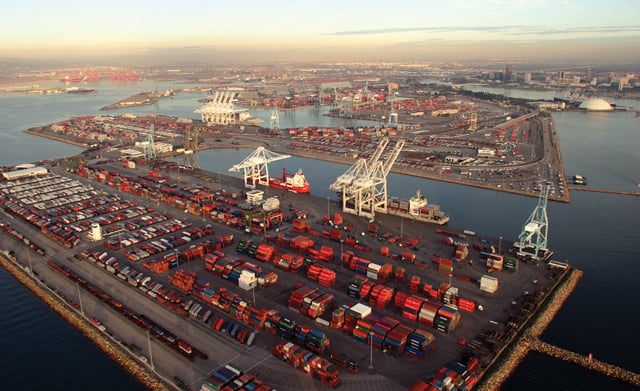
Proposed changes in the fee structure for container pickups at the ports of Los Angeles and Long Beach have caused a rift among end-users of the logistics chain.
Large freight owners such as retailers are pushing back against the plan, which would eliminate an option for them to avoid fees altogether.
The organization spearheading the fee change is Long Beach-based PierPass Inc., a not-for-profit created by the West Coast Marine Terminal Operators Association. The group comprises all 12 container terminal operators at the ports, and started in 2005 as a way to alleviate traffic congestion during peak traffic hours.
PierPass currently charges a “traffic mitigation fee” of $72.09 per TEU, or 20-foot-equivalent, for container pickups between 3 a.m. and 6 p.m. on weekdays. The pricing was intended to encourage cargo pickups during night and weekend hours when the fee is waived.
The plan worked so well that it created a separate issue: long queues of truckers lining up during the off-peak nighttime hours on weekdays, when some terminals provide service by appointment and others operate on a first-come-first-served basis.
The newly proposed PierPass 2.0 calls for an appointment-based system and flat fees of $31.52 per TEU, and $63.04 for bigger container sizes. The fees would apply to all pickups, irrespective of day or time.
“We do want the current PierPass system to modernize,” said Weston LaBar, chief executive of the Long Beach-based Harbor Trucking Association, which represents trucking companies hired by the freight owners. “It’s an uneven playing field at the moment, with smaller freight owners forced to make daytime appointments because the larger ones have more leverage with volume.”
Smaller and mid-sized freight owners support the flat fee, which would cut the price they pay on daytime pickups by 55 percent.
The larger freight owners that have come to dominate the off-peak hours at the terminals will go from no fee to paying at least the same rate as small rivals.
A letter to the Federal Maritime Commission by the Arlington, Va.-based Retail Industry Leaders Association urged the agency to reject the fee proposal.
“… Such core price-fixing authority is now entirely divorced from the alleviation of terminal congestion and is proposed as solely a revenue-generating mechanism for terminal operators,” the letter stated.
The West Coast Marine Terminal Operators Association first filed the proposal to update the program with the Federal Maritime Commission in April.
“When the Commission receives an agreement, it has 45 days to determine if what is filed is consistent with relevant competition laws,” said agency spokesman John DeCrosta. “The agreements are assessed to assure … it does not lead to an unreasonable decrease in service or unreasonable increase in costs.”
The agency on May 24 requested additional information about the proposed changes from PierPass. It’s expected to start another 45-day extension once it gets a response from PierPass.
The maritime commission will ultimately have two options: take no action to prevent the plan from becoming effective; or seek an injunction to stop it in federal court, DeCrosta said.
